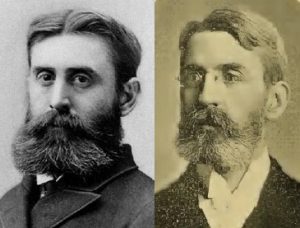 Bible memorization should be promoted within Presbyterian and Reformed Christianity in conjunction with the existing emphasis on catechesis. Catechisms are emphasized so that children and novices in the faith can learn the system of doctrine taught in the Bible. It is clearly advisable to catechize for grounding in the faith, but could it be that the Reformed shy from Bible memorization because it is often affiliated with the biblicism of some churches and other ministries within Evangelicalism? Given that the driving sola of the Reformation was Scriptura, it is appropriate to reconsider the association of catechesis with Bible memorization. Some direction is provided from the household of the Lion of Princeton, the Warfields of Grasmere, Kentucky.
Bible memorization should be promoted within Presbyterian and Reformed Christianity in conjunction with the existing emphasis on catechesis. Catechisms are emphasized so that children and novices in the faith can learn the system of doctrine taught in the Bible. It is clearly advisable to catechize for grounding in the faith, but could it be that the Reformed shy from Bible memorization because it is often affiliated with the biblicism of some churches and other ministries within Evangelicalism? Given that the driving sola of the Reformation was Scriptura, it is appropriate to reconsider the association of catechesis with Bible memorization. Some direction is provided from the household of the Lion of Princeton, the Warfields of Grasmere, Kentucky.
Commenting in his brief biographical memorial for his brother Benjamin B. Warfield, Ethelbert D. Warfield said,
He was so certain that he was to follow a scientific career that he strenuously objected to studying Greek. But youthful objections had little effect in a household where the shorter catechism was ordinarily completed in the sixth year, followed at once by the proofs from the Scriptures, and then by the larger catechism, with an appropriate amount of Scripture memorized in regular course each Sabbath afternoon (Works, 1:vi)
The teaching tools used by William and Mary Warfield with their children were the Shorter and Larger Catechisms, along with the sometimes-tenuously related Scripture proofs found in the Shorter. Since Ethelbert specifically says he and his brother memorized Scripture, then it would appear catechesis involved the boys sitting in the parlor with a parent using the question-and-answer format to teach the boys. The question is, what does Ethelbert mean by “completed” with reference to the catechisms? If the Warfield children had memorized the catechisms, it would seem Ethelbert would have said so. Of course, as they were directed through the questions and answers with repetition, they became sufficiently familiar with them to remember their content. Memorizing the Bible was part of every catechetical session as both catechisms and proofs of the shorter were worked through. If this practice was used by two covenant sons that matured to become premier educators, scholars, and exemplars of the faith, then Bible memorization should be emphasized with catechesis to ground believers in the faith. Unfortunately, it would be interesting to have the list of verses memorized by the Warfield boys, but one could not be located (see Notes).
Psalm 119 is the longest chapter in the longest book of the Bible, with its topic being the Word of God. It just so happens that in the English Standard Version the psalm begins eight pages short of dead center of the whole Bible (not a study Bible). It is also organized by means of an acrostic that follows the Hebrew alphabet. The first section begins with aleph, the second section beth, and so on. Throughout the lengthy psalm are found mentions of meditation, the heart, and loving the Law of God. At the beginning of beth are these verses.
Wherewithal shall a young man cleanse his way? by taking heed thereto according to thy word. With my whole heart have I sought thee: O let me not wander from thy commandments. Thy word have I hid in mine heart, that I might not sin against thee. (KJV)
For one to walk uprightly and follow God’s revealed perfect written will, Scripture must be a part of life not only through personal, family, and church worship, but also stored within by memorization. Repetition is the mother of memory and sometimes by default verses are memorized through repeated use, such as the Aaronic blessing found in Numbers 6:24-26 that is often used for concluding worship services in churches that still have benedictions.
The Lord bless you and keep you; the Lord make his face to shine upon you and be gracious to you; the Lord lifts up his countenance upon you and give you peace.
This wonderful passage stored in the memory by repetition or study prepares worshippers for the week as they hear of grace and peace.
Moving to Matthew 4:1-11 in the New Testament, the Scriptures were central to Jesus’ victory over temptation in the wilderness. For each of the three temptations presented by Satan, Jesus responded using passages from Deuteronomy each of which is prefaced by “It is written.”
Man shall not live by bread alone, but by every word that comes from the mouth of God. (8:3)
You shall not put the Lord your God to the test. (6:16)
You shall worship the Lord thy God, and him only shall you serve. (6:13)
With each response from Jesus the tempter gives no response. In the second temptation Satan even uses Scripture to tempt Jesus, which shows the sly stealth of the roaring lion that prowls about seeking whom he may devour. Jesus responded to these temptations with the Word of God. He is the Word become flesh and the written word was the means to resist temptation.
In the current educational environment, memorization, or as it was called in the past, rote, is not considered a viable way to teach students. Those that use memorization are deemed primitive and benighted individuals as they cling to such antiquated methods used by prairie school marms. Smartphone addiction has not helped the situation since students believe having something in their heads is unnecessary because they can access facts through a few taps on the phone screen in their hands. No matter how remarkable smart phones are nothing beats having Bible passages in mind and their residence in the gray cells requires memorization. The Holy Spirit recalls memorized passages at the most opportune times of need whether it be for resisting temptation or encouragement in tough times. Memorization is a good thing, and it is especially good with respect to writing the Word on the tablets of the heart.
Bible memorization can be as intensive as you want it to be. Some individuals can memorize a verse a day, others one or two a week, but some particularly gifted individuals memorize massive amounts of the Bible. William H. McGuffey, professional educator and author of the famous readers, memorized whole books of the Bible, volumes of classical literature, and could remember entire sermons he heard only once. Obviously, he was especially gifted and his memorized Bible passages come forth in the pervasive use of Scripture in his readers. But do not be intimidated by the accomplishments of individuals the Lord called for special work and thus equipped them with massive memorization ability. Remember that it is better to memorize something than nothing.
How is one to get started memorizing Bible passages?
One can begin with the shortest verse in the Bible, John 11:35, “Jesus wept.” Some might wonder how memorization of such a short passage could be beneficial. Any passage memorized comes from a context and each text stored in the memory can be the key to remembering the content of its chapter. Why did Jesus weep? Because he was suffering emotionally for the loss of his friend Lazarus and mourning for his family. It is the verse that is soon followed by the eschatological miracle of Jesus raising Lazarus from the dead. John 11:35 is at the center of the Beloved Disciple’s gospel because it anticipates Jesus’ crucifixion and resurrection. Raising Lazarus from the dead incenses the Pharisees causing them to put in effect a plot to kill Jesus. It all began when Jesus responded to His weeping by raising Lazarus. Additionally, John 11:35 provides a brief first memorization verse for the youngest of children.
Another way to get started memorizing is through organizations that offer tools such as flash cards and audios for listening to verses. There are probably applications for smartphones that help with memorization. The book of Romans can provide a theological overview of some points of doctrine; one method of memorization is using the Romans Road, which is several verses sprinkled through the epistle used for evangelism. Memorization of verses is easier if they have special meaning for the one memorizing. For example, you have trouble with your temper and need to learn patience, so Paul’s encouragement regarding unity in the church in Ephesians 4:1-3 might be good to memorize.
I, therefore, a prisoner for the Lord, urge you to walk in a manner worthy of the calling to which you have been called, with all humility and gentleness, with patience, bearing with one another in love, eager to maintain the unity of the Spirit in the bond of peace.
When you are reading the Bible and a particular verse hits home, then write it on a card, tap it into your phone, or record and play it as you take your walk or workout.
When I was in college, I joined three guys memorizing verses using a system that is still available today. We learned a certain number of verses each week, then met and recited them to provide accountability. The program extended through the academic year with about 75 verses learned. The toughest aspect was remembering the address of each passage, that is, book, chapter, and verse, which is a common problem. But it should be kept in mind that the Bible books did not have chapters until the early thirteenth century and the versification currently in the English Bible was first used in the Geneva Bible of 1560. If you memorized Bible passages before the early thirteenth century the only reference would have been the book from which the passage was taken, so if passage addresses are hard to retain, just imagine you live before the thirteenth century. I decided to join the group because of one of my professors. He became a Christian as an adult. The subject of the class he was teaching was one that I had a blind spot about, so early on I visited his office to get help. The first time I walked in the small office I was surprised to see taped to every available formerly blank wall space was a Bible text. He said that when he made a phone call and had to wait for some reason, he would just pick a verse, read it, and then go over it in his mind. This method is likely not for everyone, but it shows that creatively using otherwise lost time can contribute to memorization.
Bible memorization is always a good thing but as the West continues to distance itself from Christianity, it is important that all believers be well equipped with the Word. The animosity of much of academia, public education, elected officials, and information agencies towards Christ and His people will only increase barring a special gracious condescension of the Triune God to bring many into the Kingdom of God through faith in the risen Lord. Consider joining the Warfields in Bible memorization and catechesis as you, first, train yourselves, then train up the children in the way they should go.
Barry Waugh
Notes—The header of Matthew 4:1-11, Jesus’ temptation in the wilderness, is from the Geneva Bible, 1606 printing, as on Internet Archive. Portraits are B. B. Warfield on the left and Ethelbert on the right (remarkable likenesses but I wonder if younger brother Ethelbert was copying his big brother). Information about other siblings of Benjamin and Ethelbert was located, but I could not verify that they had two sisters. I do not believe they would have been excluded from Lord’s Day afternoon sessions, unless they met with Mary and the boys with William.





